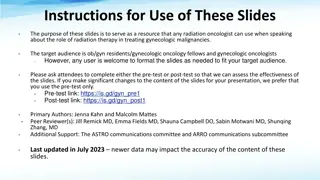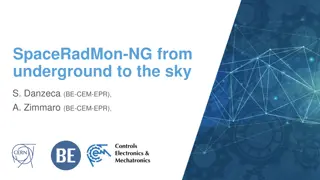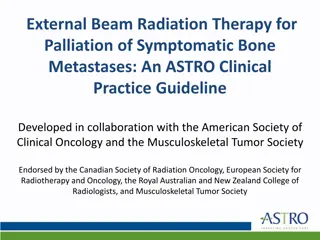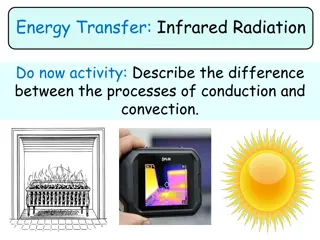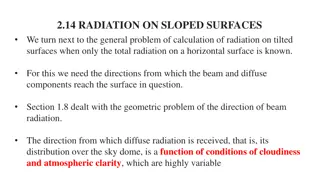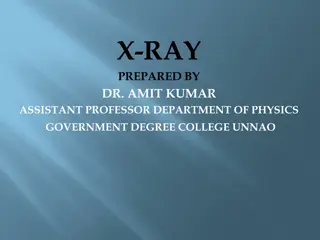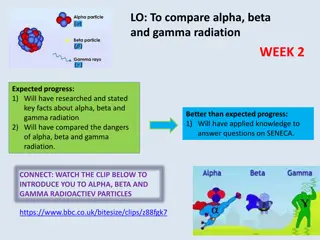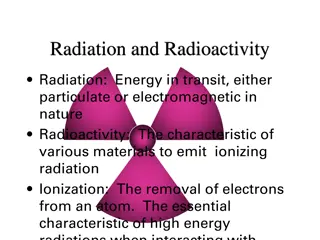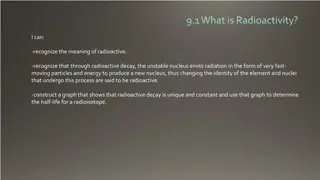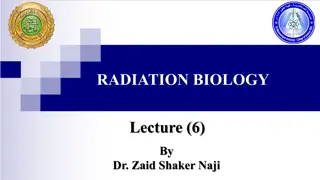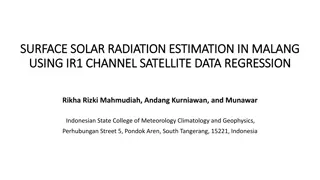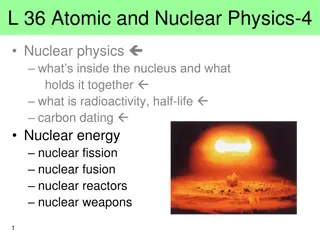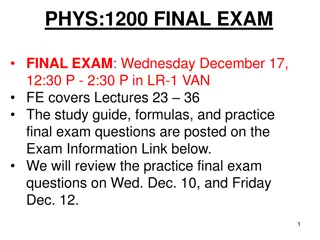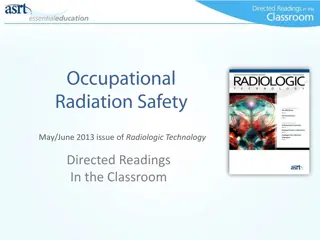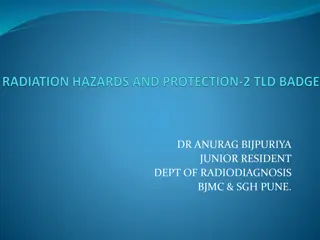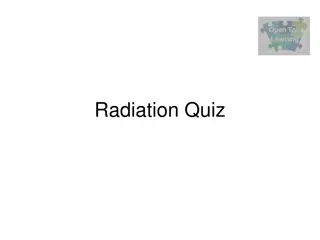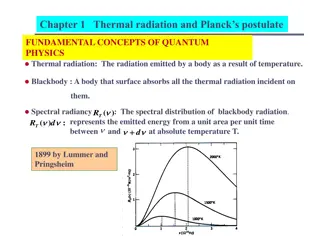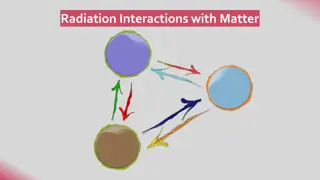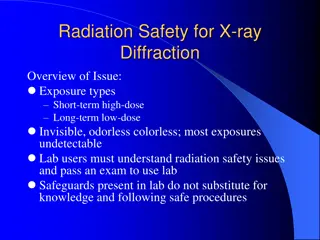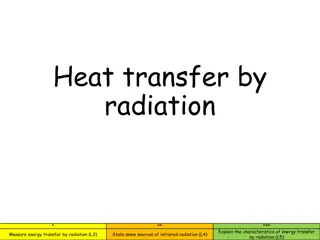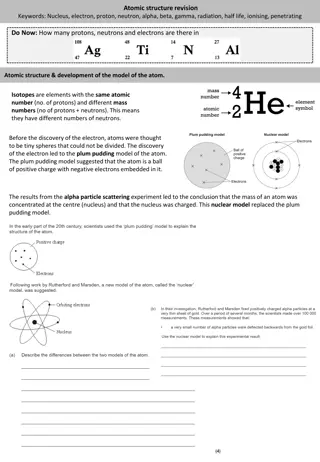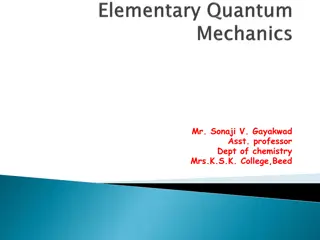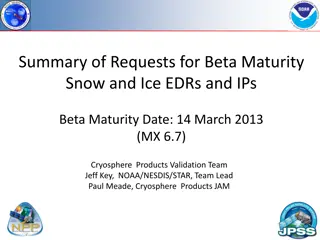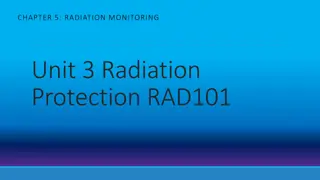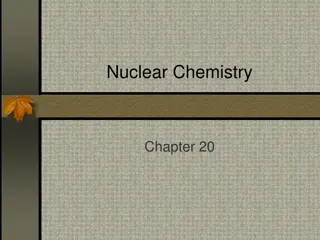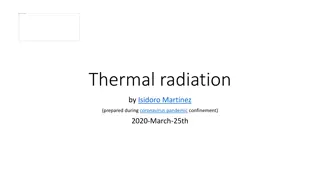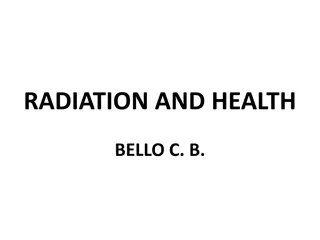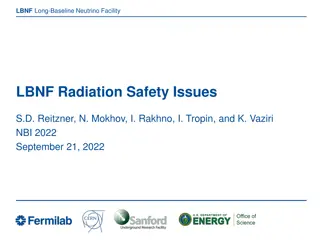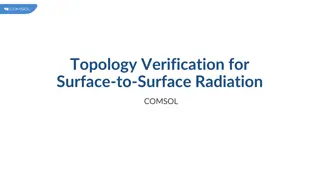Radiation Therapy for Gynecologic Malignancies - Comprehensive Overview
These slides serve as a valuable resource on radiation therapy for gynecologic malignancies. Key topics covered include radiation delivery techniques, indications for therapy, how radiation works, dosing considerations, and more. Suitable for radiation oncologists, ob/gyn residents, and gynecologic
3 views • 64 slides
Understanding Beta-Lactam Antibiotics: From Penicillin to Carbapenem
Explore the fascinating world of beta-lactam antibiotics, from the discovery of Penicillin by Alexander Fleming to the different classes like Cephalosporin, Penams, and Carbapenem. Learn about the common structure of beta-lactam rings and how they inhibit bacterial cell wall synthesis. Dive into the
1 views • 16 slides
Understanding Radioactive Decay and Nuclear Radiation
Radioactive decay is the process in which unstable atomic nuclei emit charged particles and energy, transforming into different elements. This process involves the emission of alpha particles, beta particles, and gamma rays. Alpha particles consist of two protons and two neutrons, beta particles are
4 views • 31 slides
SpaceRadMon-NG: Revolutionizing Radiation Monitoring in Space Missions
The SpaceRadMon-NG is a cutting-edge radiation monitoring device designed for CubeSats, offering advanced capabilities for measuring Total Ionizing Dose (TID) and High Energy Hadrons (HEHs) fluence. Developed as a next-generation solution, it aims to enhance diagnostic and environmental monitoring i
4 views • 15 slides
Exploring Lunar Surface Radiation Risks and Mitigations Using Bioengineering
Lunar Explorer Instrument for space biology applications, LEIA Mission, addresses radiation health risks for crewed lunar exploration. The project aims to engineer yeast strains to study radiation sensitivity and identify genetic factors affecting cellular response. The instrument suite includes Bio
6 views • 8 slides
Radiation and Black Body Radiation in Astrophysics
Explore the concepts of radiation and black body radiation in astrophysics by analyzing the peak emissions of the Sun, Earth, and distant stars. Calculate black body radiation peaks, temperatures, and power outputs for various celestial bodies, as well as heat transfer rates in different scenarios.
0 views • 29 slides
Sau khi chuyển phôi nên ăn gì để beta cao
Sau chuy\u1ec3n ph\u00f4i \u0103n g\u00ec \u0111\u1ec3 beta cao l\u00e0 \u0111i\u1ec1u \u0111\u01b0\u1ee3c c\u00e1c m\u1eb9 \u0111\u1eb7c bi\u1ec7t quan t\u00e2m b\u1edfi ch\u1ec9 s\u1ed1 beta hCG l\u00e0 x\u00e9t nghi\u1ec7m m\u00e1u th\u1ef1c hi\u1ec7n sau khi chuy\u1ec3n ph\u00f4i.
0 views • 3 slides
ASTRO Clinical Guideline on Palliative Radiation Therapy for Symptomatic Bone Metastases
This ASTRO clinical guideline focuses on the use of external beam radiation therapy for palliation of symptomatic bone metastases, emphasizing its efficacy in pain management and local symptom control. Updated evidence and recommendations address the evolving landscape of metastatic cancer treatment
0 views • 32 slides
Understanding Infrared Radiation in Energy Transfer Experiments
Explore the difference between conduction and convection, sources of infrared radiation, and how energy is transferred through radiation. Investigate how different surfaces emit varying levels of infrared radiation using a practical experiment with black and silver tins. Analyze and interpret result
0 views • 11 slides
Calculation of Radiation on Sloped Surfaces
The general problem of calculating radiation on tilted surfaces when only the total radiation on a horizontal surface is known involves determining the direction from which the beam and diffuse components reach the surface. Diffuse radiation models consist of three parts: isotropic, circumsolar, and
1 views • 15 slides
Understanding X-Ray Radiation: A Comprehensive Overview
X-ray radiation, discovered by Wilhelm Conrad Roentgen in 1895, is a high-energy electromagnetic radiation with a frequency range of 3.10^16Hz to 3.10^19Hz and a corresponding wavelength range from 0.01nm to 10nm. This form of radiation has applications in various fields, and its properties make it
0 views • 15 slides
Understanding Alpha, Beta, and Gamma Radiation: a Comparative Analysis
Explore the key differences between alpha, beta, and gamma radiation, their structures, penetration powers, absorption materials, ionizing abilities, and dangers. Learn about isotopes, radioactive decay, and the unique characteristics of each type of radiation. Dive into creating fact sheets and und
2 views • 7 slides
Understanding Radiation and Radioactivity in Science
Radiation is energy in transit, while radioactivity is the emission of ionizing radiation by materials. This process involves ionization, which removes electrons from atoms, leading to various nuclear decay processes such as alpha decay, beta decay, gamma-ray emission, positron decay, electron captu
0 views • 80 slides
Understanding Radioactivity and Nuclear Radiation
Radioactivity is the process in which unstable nuclei emit radiation, such as alpha, beta, or gamma particles, to become stable. This emission can change the element's identity and is crucial in fields like nuclear power and understanding Earth's core heat source. Different radioactive isotopes like
0 views • 12 slides
Understanding Radiation Pollution and Its Effects
Radiation pollution, whether ionizing or non-ionizing, is a significant environmental concern. Ionizing radiation can penetrate tissues and cause damage to living cells, while non-ionizing radiation may effectively sterilize microbes. Sources of radiation include cosmic rays, terrestrial elements li
0 views • 15 slides
Understanding Beta-Lactam Antibiotics in Pharmaceutical Chemistry
Antibiotics, particularly beta-lactam antibiotics, play a vital role in combating bacterial infections. This article explores the definition, classification, and mechanism of action of antibiotics. It delves into the structural features of penicillins, emphasizing the importance of the beta-lactam r
0 views • 84 slides
Understanding Radiation Pollution and Its Sources
Radiation pollution is a serious environmental concern caused by both ionizing and non-ionizing radiation. Ionizing radiation, such as alpha and beta particles and gamma rays, can lead to cellular damage, while non-ionizing radiation, like solar radiation, can also impact living organisms. Sources o
0 views • 15 slides
Understanding Biological Effects of Radiation in Radiation Biology Lecture
This lecture by Dr. Zaid Shaker Naji delves into the biological effects of radiation, including deterministic and stochastic effects. It covers mechanisms of damage at the cellular level, such as direct and indirect damage, and discusses somatic and genetic damages that can arise following exposure.
0 views • 10 slides
Estimation of Surface Solar Radiation in Malang Using Satellite Data Regression
Surface solar radiation estimation in Malang is conducted using IR1 channel satellite data regression. This study aims to fill the gap in radiation observation data by utilizing cloud top temperature measurements from IR imagery. The methodology involves determining radiation values based on atmosph
4 views • 13 slides
Understanding Nuclear Physics: Inside the Nucleus and its Impact
This content explores nuclear physics, covering topics like what's inside the nucleus, radioactivity, half-life, carbon dating, nuclear energy, fission, fusion, reactors, and weapons. It delves into the structure of the nucleus, radioactive decay processes, nuclear reactions, biological effects of r
0 views • 29 slides
Understanding Nuclear Physics and Radiation Hazards
Exploring the world of nuclear physics, this content covers topics like nuclear reactions, radioactivity, biological effects of nuclear radiation, and hazards of radiation exposure. It delves into the structure of the nucleus, radioactivity processes, nuclear energy, and the biological impacts of io
0 views • 30 slides
Understanding Ionizing Radiation in Medical Imaging
Radiation in medical imaging plays a critical role in diagnosis and treatment but also poses risks to patients and healthcare workers. Ionizing radiation, used in various imaging modalities, can cause harm to healthy cells if not managed properly. This article discusses the implications of radiation
0 views • 54 slides
Radiation Detection and Dosimetry in Medical Imaging
Radiation detection and measurement are essential in radiology. Various instruments like ionization chambers, film badges, thermoluminescent dosimeters, and pocket dosimeters are used to monitor radiation exposure. Personnel dosimetry is crucial for tracking radiation doses over time to ensure safet
2 views • 31 slides
Test Your Knowledge with the Radiation Quiz!
Explore various questions related to radiation, lasers, lenses, x-rays, background radiation sources, and radiation protection measures in this engaging quiz. Test your understanding of these scientific concepts and learn new information along the way. Challenge yourself with multiple-choice questio
0 views • 26 slides
Thermal Radiation and Planck's Postulate: Fundamental Concepts of Quantum Physics
Thermal radiation is emitted by bodies due to temperature, with blackbodies absorbing all incident thermal radiation. Spectral radiancy of blackbody radiation indicates varying power with temperature and frequency. Stefan's law, Wien's displacement law, and classical theories like Rayleigh and Jeans
0 views • 16 slides
Understanding Ionizing Radiation and Its Interactions with Matter
Ionizing radiation interacts with matter in direct and indirect ways, leading to various effects on biological systems. Directly ionizing particles disrupt atomic structures, while indirectly ionizing radiation like electromagnetic waves produce secondary electrons. Alpha particles have high ionizat
0 views • 22 slides
Understanding Radiation Safety for X-ray Diffraction in Labs
Exposure to X-ray radiation in laboratories poses short-term high-dose and long-term low-dose risks, which are invisible and undetectable. Lab users must comprehend radiation safety principles, pass exams, and adhere to safe practices. Safety requirements include passing a radiation safety exam cove
0 views • 20 slides
Ethics Jeopardy: Courthouse Ethics Scenario
In this courthouse ethics scenario, a lawyer named Beta takes over an appeal case after their partner, Alpha, suffers a heart attack. During the oral argument, Beta makes a statement based on Alpha's brief without confirming its accuracy. The question arises whether Beta should face discipline for p
0 views • 79 slides
Understanding Energy Transfer by Radiation and Infrared Sources
Explore the characteristics of energy transfer by radiation, learn how to measure this transfer, discover sources of infrared radiation, and understand the effects of surface properties on absorption and emission. Find out why dark surfaces absorb more radiation, how objects emit and absorb infrared
0 views • 28 slides
Understanding Atomic Structure and Radiation Phenomena
Explore the development of the model of the atom, isotopes, types of radiation, half-life, and nuclear fission/fusion processes. Learn about the structure of the nucleus, behavior of alpha, beta, and gamma radiation, and the implications of radioactivity on health and energy production. Discover how
0 views • 4 slides
Understanding Black Body Radiation: Key Concepts and Applications
Black body radiation is a fundamental concept in physics, with theoretical black bodies absorbing all radiation. While no material is a perfect black body, carbon comes close. This radiation curve demonstrates energy emission at different wavelengths, influenced by temperature variations. Stars serv
0 views • 13 slides
Cryosphere Product Beta Maturity Summary and Comparison
Requests for beta maturity of snow and ice EDRs and IPs were addressed on 14 March 2013 by the Cryosphere Products Validation Team. Criteria for beta justification and validation were outlined for various users in the U.S., including NOAA and NASA. Specific focus was on the VIIRS Ice Surface Tempera
0 views • 23 slides
Radiation Monitoring and Personnel Dosimetry: A Comprehensive Guide
This chapter delves into the importance of personnel dosimetry in radiation protection, covering topics such as dosimeter placement, types of dosimeters, radiation survey instruments, and calibration tools. It highlights the necessity for monitoring radiation exposure regularly to ensure safety with
0 views • 59 slides
Understanding Protein Structural Motifs: The Beta Turn
In the realm of protein structure, the beta turn plays a crucial role in folding patterns. This simple motif involves a 180-degree turn in the backbone, linking adjacent beta strands. Typically consisting of 2 to 5 amino acids, with glycine often at position 3 and proline at position 2, the beta tur
0 views • 5 slides
Understanding Nuclear Chemistry: A Comprehensive Overview
Explore the world of nuclear chemistry in Chapter 20, covering stable and unstable isotopes, radioactivity, radiation exposure, radioactive particles, types of radiation (alpha, beta, gamma), and how to stop radiation. Learn about isotopes, decay processes, and the impact of radiation on our daily l
0 views • 18 slides
Understanding Thermal Radiation and its Effects
Thermal radiation, studied by Isidoro Martínez during the COVID-19 pandemic, explores the transfer of heat through conduction, convection, and radiation. It delves into the concept of thermal effects of radiation, blackbody radiation, and related laws like Planck's law, Stefan-Boltzmann's law, and
0 views • 23 slides
Understanding Radiation and Its Effects on Health
Radiation is a form of energy that can be emitted from radioactive materials in the form of particles or waves. It can be either ionizing or non-ionizing, with ionizing radiation having the ability to penetrate tissues and deposit energy within them. While alpha particles, beta particles, x-rays, an
1 views • 38 slides
Understanding Radiation in Heat Transfer for Grade 7 Natural Sciences
Exploring the concept of radiation in heat transfer for Grade 7 Natural Sciences, this content delves into how electromagnetic waves carry heat and light energy. It highlights the difference between radiation, conduction, and convection, emphasizing that radiation transfers heat energy through waves
0 views • 10 slides
LBNF Radiation Safety Issues Overview
The Long-Baseline Neutrino Facility (LBNF) addresses radiation safety issues through various components such as prompt radiation, residual radiation, activated air release, and ground water protection. Detailed modeling parameters using MARS for radiological safeguards are discussed, along with prom
0 views • 17 slides
Surface-to-Surface Radiation Verification and Boundary Detection in COMSOL
Explore the verification of surface-to-surface radiation setups in COMSOL, detecting incorrect radiation configurations with nonradiating boundaries. Learn how to identify and resolve nonradiating boundaries, ensuring accurate and effective radiation simulations. Discover the importance of selecting
0 views • 10 slides
